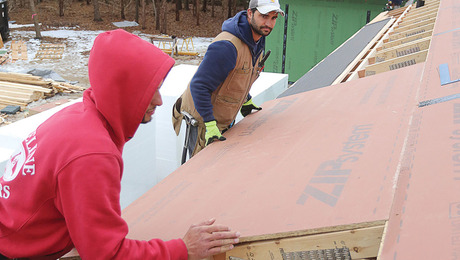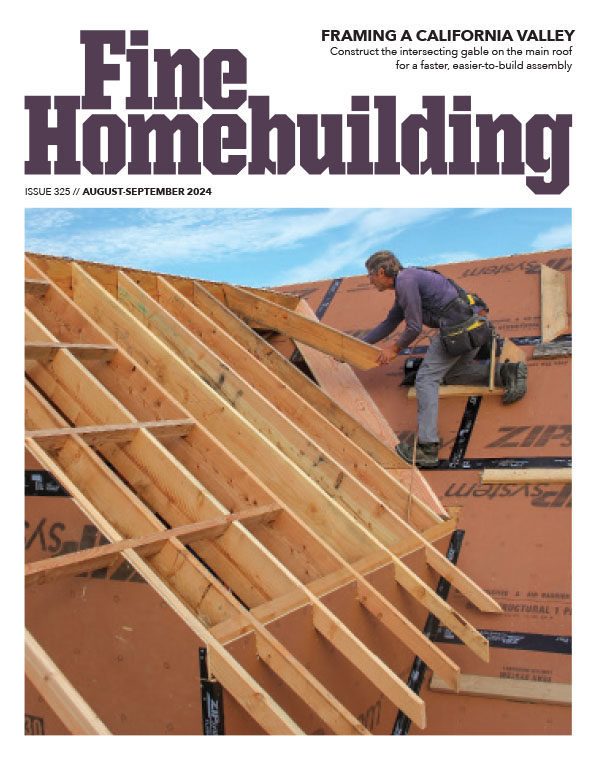Potential client wants a price on studding out his basement walls, insulating, installing greenboard, and a drop ceiling. Nice work, if you can get it. I have a problem with it though. The greenboard.
He specified greenboard because he has had moisture problems in the past. Not since he installed a dehumidifier, however. But my hesitation on doing the work is getting a call back in a year or two because the studs have begun to rot from the moisture trapped between the insulation and cement wall.
Should I not take the job and recommend curtain/french drains be installed prior to finishing the basement (no such moisture abatement systems are in place, neither is there any ‘sealer’ on the inside, not that that would do much for the long term. Neither is the HO likely to install any such systems; the house just isn’t worth it and the budget won’t allow it.) Or should I take the job with a proviso that excludes me from any future damage caused by moisture? Or just not take the job at all.
Honestly, I haven’t gotten back to them in a week because I have one of those gut feelings that the job will be far from over after the ceiling is installed and the last drop of paint applied.
Any recommendations?
















Replies
Metal studs maybe? And a disclaimer clause in the proposal & contract. Maybe denshield rather than greenboard?
Do it right, or do it twice.
Metal studs.
Who Dares Wins.
By specifying the greenboard, he's being open about moisture problems, and admits the possibility of future problems as well.
I'm in with the others, and with you. Write a little letter for him to sign as an acknowledgement of existing conditions (moisture) and use metal studs in the remodel.
What type of insulation were you (or the owner) thinking of using? FG? Beadboard?
His desire was to have as minimal wall thickness and insulation as possible. I suggested ripping 2xs and install 1.5" foam. (None of this is structural, obviously. The intent is to have an area with finished walls.) I'm not a big proponent of FG in potentially damp conditions.
Thanks.
I never met a tool I didn't like!
I would trust my gut on this one!
I once had to move some drywall scrap that had been rained on. To my surprise, the green board fell apart in my hands as I tried to pick up a piece. The reguar white board stayed far more intact. I haven't used green board since that time.
The disclaimer is a good idea, but I'd probably listen to my gut. I've been sorry in the past when I didn't.
Metal studs!!!????
You want the callback to be about rust instead of rot!!???
Fix the water problem right or assume NO responsibiity.
Suggesting metal studs implys that you know how to do it right.
metal studs are rust-resistant not rust proof!
C'mon guys we know better that that!!Mr T
Do not try this at home!
I am an Experienced Professional!
This is a legal issue regarding disclaimers. I've no immediate experience with this, but do disclaimers really protect us in this lawsuit happy society? You can be sued for anything, disclaimer or not. Juries don't seem to be sympathetic with business. They go for the throat to the advantage of the poor suffering consumer.
My inclination would be to be extremely honest with the guy and tell him why you think the greenboard is a bad idea. Greenboard or not, the moisture will come back to haunt him or you or both. Explain to him that you want to do it right for your protection and his benefit. If he insists on doing it half baked, it may be better to walk away.
Does he have a WATER problem, a MOSITURE problem due to high humid air, or does he have MOSITURE problem due to mositure wicking through the walls.
There are water stains on the floor. Although SE Connecticut can get humid in the summer, it only lasts for a few weeks. He has moisture wicking through the walls (they are stained as well, although primarily isolated to one corner.)
I forgot to add that the house (sitting on a level lot) is plagued by a high water table, flanked by a river to the east and a pond to the west, both bodies of water less than a quarter mile away. That's the real reason for my hesitation; the potential for future problems is real and probable. Now that I think about it, with a high water table, what kind of drainage can you implement and be effective?
I thought about metal studs, but with them trapped between the vapor barrier and the cement walls, I'm not sure they would last any longer than doug fir; and the HO wants the walls 2" thick or less.
LOL, the more I write about this, the more I see there could be considerable headache in the future.
This is one of those jobs I would love to knock out, it's really a no brainer, but again, the potential for having to rip it all out and address a rotting problem looms large.
Anyone have any success with sealing a basement from the inside? (Don't depend on it, I know, just grasping at straws.)
Thanks again for your input. As usual, the forum gives me plenty to mull over.
I never met a tool I didn't like!
I'm with the "go with your gut and stay away" crowd. Even if you keep him off your back when problems arise, what if he sells the hosue next year and some mold maniac starts b!tching? You were the expert who did the job blah blah blah
_______________________
Albert Einstein said it best:
“Problems,” he said, “cannot be solved at the same level of consciousness that created them.”
Your mileage may vary ....
Good point, I hadn't even considered the mold possibility. Sometimes I wish for simpler times, when houses were built with mortise and tenon joints, an adze and a sharp slick. Of course, childhood was a bit more perilous, what with scarlet fever and cholora (sp) taking the young-uns, and all.
What kind of a society preys upon its own? One on the decline, I fear. Another time, another place. It's late and I have to trim out windows on the marrow, unleashing the dregs of society by plunging into the sweet, intoxicating flavor of working with hands and tools, Gods given right to man.
Whatever. Time to cuddle up with soft curves, a light caress, and the hint of apple blossom conditioner.
I never met a tool I didn't like!
Our local code dictates poly against the wall, then studs. Toured an old house this weekend where the entire exterior wall floated about 2" from the foundation (old rock foundation). Poly, studs/FH, sheetrock, carpet, finished ceiling. They left one utility room open where they ran a dehumidifier. I guess the theory is that this would 'suck' any moisture trapped around the perimeter.
I didn't like it. The basement felt musty already even though it was only a month or so old.
In our case, we're gluing EPS against the wall with a foot gap at the bottom. Then metal studs, sheetrock upper 4ft, some sort of (removable and vented) paneling on the lower part. No VB. The panelling is easily removable in the off chance of real water problems, but also just for easy access later (it is a basement, afterall...why hide all the utilities?) plus we wanted the wainscotting look.
Be up front and honest with him from the start. Detail all potential problems, ex. moisture, lack of French drains, waterproof membrane, etc.) Then propose all resonable solutions to the seen and potential problems. Indicate exactly what supplies you are going to use (metal vs. wood) (green board vs. regular) then have him sign and have 3rd party witness the signature. Give him a copy and keep a copy for your self.
Indicate that you are not offering a written or implied warranty for any damage that arises from moisture or water.
If this doesn't sound like a reasonable offer, I suggest that you walk away, because it will only come back to bite you tenfold.
Thanks,
Barney
How about this: Hang 4 mil poly on the concrete. Frame the walls with ripped pressure-treated plate (maybe double) and 2x3 wall frame. Fiberglass insulation. (Who wants to rip all those 2x2s and he needs to run wire, right?) Regular drywall or, better, blueboard and plaster. Keep the drywall at least an inch off the floor. If he has seasonal standing water on the floor, suggest sump pump(s).
If you frame with anything smaller than 2x3, you'll likely have to fasten it to the concrete wall and perforate the plastic.
For something completely different: just fasten plastic wall panels to the concrete. No insulation, but they're quick, look very clean and will never rot.
Seriously, though, has anyone seen basement wall framing rot from anything other than actual contact with liquid water that was wicked from the floor or leaking chronically through a crack in the wall?
Good luck! Sounds like a nice winter job. Take reasonable precautions and sleep sound.
Al Mollitor, Sharon MA
The moisture problem isn't your problem....no court on earth would find you guilty unless you started dealing with the mositure problem and there was still mold and mildew.....Seems simple enough actually..... a serious dehumidifier put in by others.
Any normal person wouldn't want to finish a basement knowing what will develop before the "problem" is corrected although I came accross a lot of morons in my time.
Metal studs and greenboard are fine but thats just avoiding the issue at hand, which spells out MORON!
TAke care of the problem and see if the moisture problem deminishes....and after several wet weather months and a cured wet basement.....rock n roll.
Be well
andy
My life is my practice!
http://CLIFFORDRENOVATIONS.COM
The moisture problem isn't your problem....no court on earth would find you guilty unless you started dealing with the mositure problem and there was still mold and mildew.....
The question isn't so much an actual finding of liability (although I don't think its quite the slam dunk you see.)
The issue is whether some disgruntled new homeowner might bring an action. Given the cost of litigation, usually stuff like that ends in an expensive settlement (expensive at least when compared to the possible profit on the deal.)
_______________________
Albert Einstein said it best:
“Problems,” he said, “cannot be solved at the same level of consciousness that created them.”
Your mileage may vary ....
Mount it all with velcro??? <g>